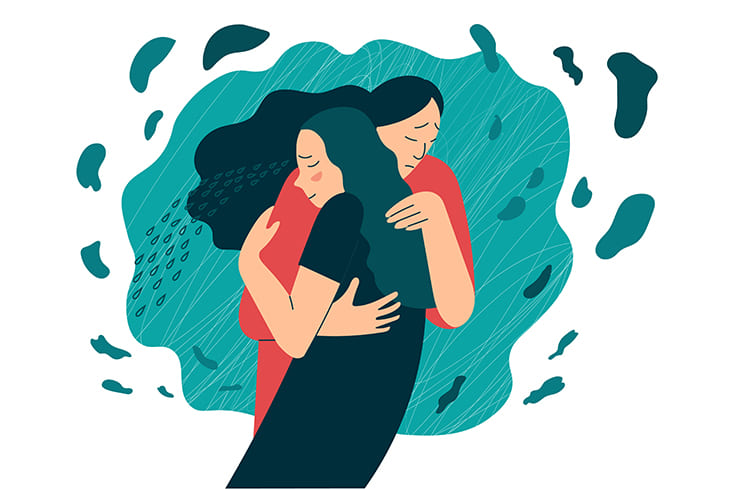May 24, 2021
By Jamie Edelbrock

The moment I found out I was pregnant with my first child, I was elated. After I saw the positive sign on the pregnancy test, like many first-time moms, I envisioned the child I was going to have and the type of parent I was going to be. In my mind, I had high expectations, and we were going to live happily without worries.
However, my expectations were brought down to reality soon after she was born. She was delightful, but life wasn’t what I expected. I didn’t realize how sore and tired I would be. I was always feeding, always changing, always worrying, always drained, never had a second to myself and never slept. All of this came as a surprise to me but, nonetheless, I was optimistic that things would improve.
There were other surprises along the way, especially as she grew and I had other children. I never expected my then 3-year-old to sneak out of the house, totally naked, and knock on my neighbor’s door asking if she could play. I never expected a trip to the emergency room with my youngest because she got a peanut stuck up her nose. I never expected another trip to the emergency room to get stitches in her chin. The list could go on. While I worked through each one of these situations, the most unexpected one was yet to come.
Around the age of six, one of my daughters started having significant behavior issues. She started acting out at home and at school, doing things she had never done before. I never expected her to make disruptive scenes in class. I never expected her to abruptly run out of the class and hide in the school bathroom or to receive a phone call from the school informing me they could not find my daughter. I never expected angry outbursts, slammed doors and the dreaded “I hate you” to come from her mouth.
I tried every technique I knew to change her behavior — the firm parent, the soft parent, incentives, charts, grounding, focusing on the positive, praising — but nothing worked. I felt like I was failing as a mother and I was desperate. I never expected to feel completely at the end of my rope, not knowing what to do next. After a lot of dark days, tears, many talks with teachers, several trips to the school counselor’s office, and numerous explosive and embarrassing scenes in public, a friend suggested that we see a mental health professional. After evaluations, my daughter was diagnosed with an anxiety disorder.
I felt so guilty as her mom. How could I have missed that she was struggling with something so big? What caused this? Was it my parenting or something I did? After talking with our therapist and doing a lot of reading, I realized it was not my fault. I had missed the signs and I just needed to be educated about her condition.
I learned that behavior issues and anxiety symptoms can look very similar, and it can be difficult to distinguish between the two.
In retrospect, here are some of the warning signs I missed with my daughter:
Having been an imperfect mom for 15 years and counting, I have been through many trials and tribulations when it comes to raising children. Many of these I certainly never expected when I was a young, first-time mom dreaming of a perfect life for my child. Thankfully, many of these surprises are ones I can laugh at in hindsight, and others served as important learning lessons.
One of the biggest unexpected moments was having my child diagnosed with anxiety. My main takeaway was the need to reach out to a mental health professional for help. Once I did, both my daughter and I received the ongoing help we needed to successfully navigate her condition. The dark days grew lighter, the outbursts diminished and, over the next few years, I watched her learn to verbalize and cope better with anxiety attacks.
I’m sure there will be more unexpected moments ahead, but thanks to the professional counselors and therapists we saw, we are much better equipped to deal with them.
Jamie Edelbrock is married to her high school sweetheart and together they have three daughters. She has worn many hats, some of which include a homeschool mom, preschool director, family ministry director, blogger and author of the children’s book “Tangled Up.” You can read more of her writings on jamieedelbrock.com.
We’re always accepting submissions to the NAMI Blog! We feature the latest research, stories of recovery, ways to end stigma and strategies for living well with mental illness. Most importantly: We feature your voices.
LEARN MORENAMI HelpLine is available M-F, 10 a.m. – 10 p.m. ET. Call 800-950-6264,
text “NAMI” to 62640, or email. In a crisis, call or text 988 (24/7).